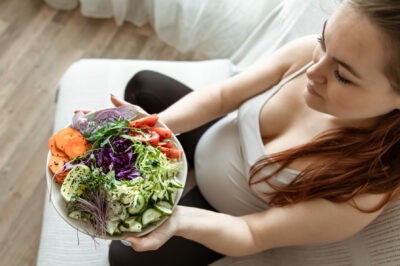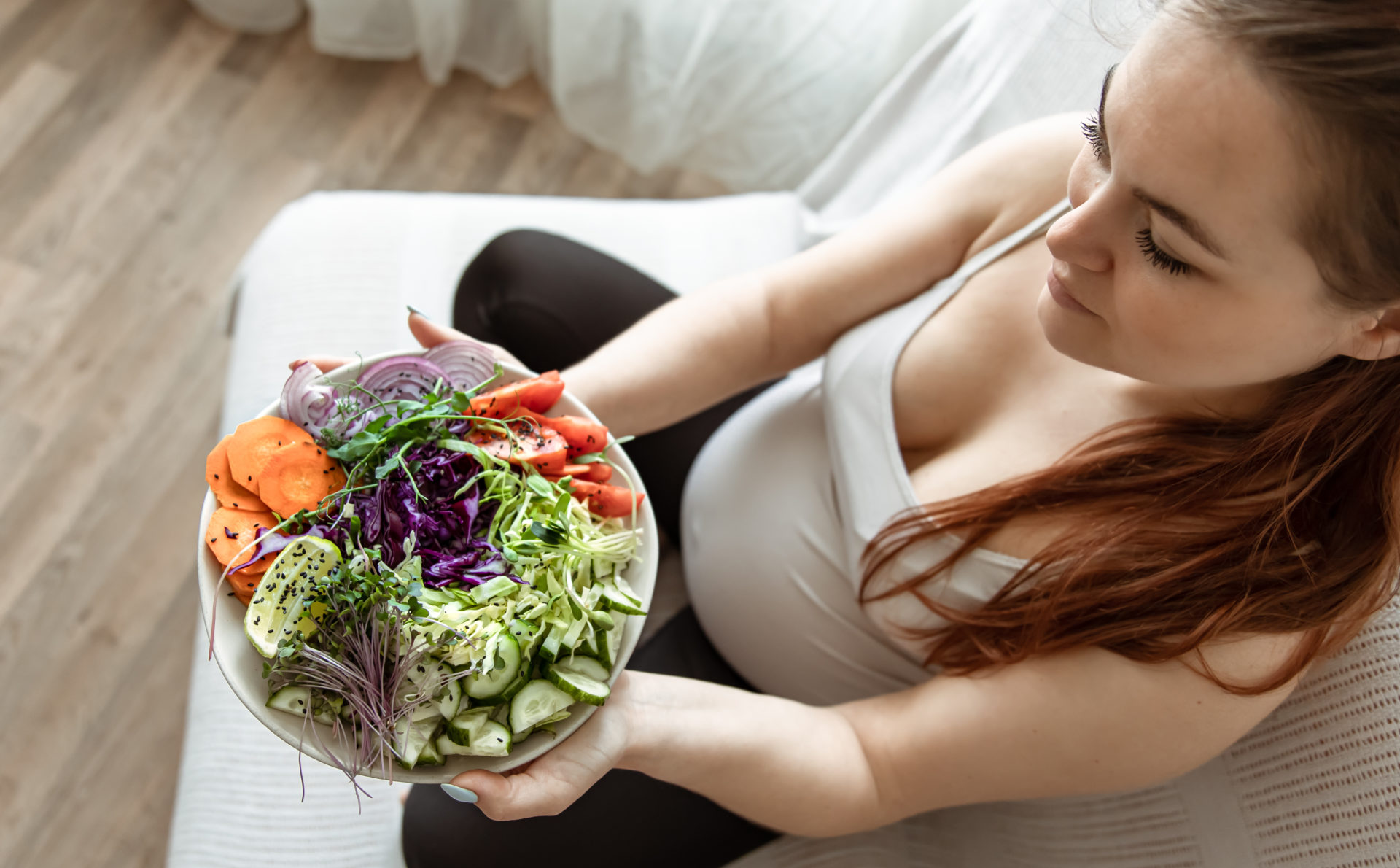Did you know that you have trillions of microorganisms living on your skin and inside of you? In fact, these non-human organisms outnumber the cells in your body ten to one! They work in partnership with your own cells and impact your health throughout your life. In fact, research shows your gut health could potentially affect generations to come.
If you’ve heard about the recent research on the human microbiome, it won’t surprise you to learn that the bacteria present in your body (specifically related to your gut health) are even more important during pregnancy and birth than they usually are.
What Exactly is a “Microbiome” and How Does it Affect My Gut Health?
Our bodies are made up of the human material that is the product of our genes, human cells. However, there are hundreds of times more than that number of micro-organisms living in and on us. These hangers-on determine our gut health and much of how well our bodies function.
Beneficial bacteria, referred to as “microbiota” (the organisms) or the “microbiome” (the organisms and their collective genetic makeup) carry out their actions by influencing immunologic, endocrine, and neural pathways.
Although a wide variety of microorganisms flourish on the skin, in the oral cavity, and the urogenital tract, those in the gut are the most diverse and abundant and their functions are currently the best understood. These microbiota are very important and do things like help your body digest nutrients, produce vitamins, fight off bad bacteria and much more.
Your personal gut microbiome is complex and varies from person to person. A person’s gut microbiome is important because it has a significant effect on your health, your immune system, and the way almost everything else in your body functions.
Your Baby’s Microbiome
Everyone starts with their own, varied gut composition. Some people naturally tend toward healthy, bacteriologically rich digestive systems. Others know they struggle.
Even if you do nothing to promote the health of your microbiome (and most people don’t), your baby will be inoculated at birth. Like most biologically imperative things, it happens on its own!
Your baby gets much of it’s personal make-up of bacteria (known as the infant’s microbiome), for better or worse, at birth and during the first months of life.
Obstetrician and childbirth specialist Michel Odent says, “It appears that there is a critical period early in life when gut microorganisms affect the brain and change behavior in later life.”
Research has found that a baby’s gut health is greatly influenced by how (vaginal delivery or c-section delivery) and where (hospital/birth center or at home) a baby is delivered along with environmental factors (breastfed vs. formula fed, illness, exposure to antibiotics, and genetics).
How Baby is Born Influences Infant Gut Health
Currently, 32% or 1 out of every 3 babies in the U.S. are born via c-section. While c-sections can be life-saving when mom or baby are facing a serious or fatal complication, the intervention is overused and has been associated with health risks to mom and baby. Babies born by c-section surgery are about 50% more likely to have childhood obesity, asthma and allergies. The World Health Organization recommends that the cesarean rate should be no higher than 10% – 15%.
A Danish study, published in the journal Pediatrics, looked at the births of 2 million babies born between 1977 and 2012. The study concluded that babies born via cesarean section had a significantly increased risk of developing:
- Asthma
- Systemic connective tissue disorders
- Juvenile arthritis
- IBS (inflammatory bowel disease)
- Immune deficiencies
- Leukemia
Among bacteriologists, the concept of “race to the surface” means that any sterile environment will be most strongly colonized by the first stuff that gets there. Vaginally born babies will have bacteria like the mother–and father, since he has been there too. When babies are born in a sterile field via cesarean, it’s not uncommon for the baby to be partially colonized by the hospital’s microbiome.
Interestingly, research has found that there are differences in a baby’s gut flora between scheduled c-sections and emergency c-sections. A mother who had the opportunity to labor and whose water has broken will pass on less microbes to her baby than via a vaginal birth but many more microbes than she would if her baby had been born via a scheduled c-section.
Vaginal Seeding
Vaginal seeding is when a mother’s vagina is swabbed for vaginal flora and then transferred to the newborn’s mouth, nose or skin following a cesarean delivery. The hope is to seed the baby with mom’s beneficial microbes that it would typically be exposed to when born vaginally.
Currently there is not enough research to prove its effectiveness beyond a small but promising pilot study. The American College of Obstetricians and Gynecologists (ACOG) has stated that “vaginal seeding should not be performed outside the context of an institutional review board-approved research protocol until adequate data regarding the safety and benefit of the process become available.”
Due to the growing interest in vaginal seeding, the first randomized controlled trial on vaginal microbiome seeding in newborns delivered by c-section, is currently underway. The Inova Translational Medicine Institute’s trial will include 800 mothers and their babies and will track each baby’s health through the first three years of life including microbiome development and health outcomes.
Where Baby is Born Influences Infant Gut Health
Allergies, eczema, and asthma (what’s known as the allergic march) are all less common in infants born at home. These babies are thought to be exposed to a better cocktail of micro-flora than the microbial community available at the hospital. Which makes sense, since sick people go to the hospital.
Try not to panic about your baby’s microbiome if you had or require a c-section. Breast milk has been found to contain many similar beneficial bacteria as those found in a mother’s vagina.
Can I Do Anything After Delivery to Give My Baby a Healthier Microbiome?
Yes! Microbes (including those with beneficial effect) found in breast milk have been proven to seed an infant’s gut.
A study published by JAMA Pediatrics in 2017 (the largest to date) found that babies who were breastfed most or all of the time had microbiomes most similar their mothers. The study included 107 healthy mothers and babies and found that in the first month of life, breastfed babies received nearly 28% of their gut bacteria from breast milk and another 10.4% from their mothers breast tissue.
Additionally, the study concluded that the more frequent the babies breastfed, the more that their gut microbiota resembled the microbiota in their moms milk. The study also found that babies who continued breastfeeding after they began solid food, continued to benefit from breast milk and had a higher population of beneficial bacteria.
Tips to Create a Healthy Microbiome
Human bodies are very intelligent. One of the things we learned recently about the body’s preparation for birth has to do with the flora present in the birth canal.
The beneficial vaginal flora becomes stronger as your due date approaches. Your body knows the baby needs it on his way out. There are ways to help your body, too!
There are good and bad microbes. You want the good bacteria like the kind found in yogurt and naturally fermented sauerkraut. You don’t want the bad, like group b strep. Yeast is another bad guy, and makes up part of your microbiome, but it’s a fungal microbe, not bacterial.
Taking probiotics and eating foods that contain probiotics will raise numbers of the good gut bacteria and help beat out the bad gut flora. Bad microbes really like sugar and are more likely to leave if you eat less of it.
Lack of the Good Microbes May to Contribute to:
- ADHD/ADD
- Autism
- Obesity
- Type-2 Diabetes
- Asthma
- Allergies
- Diverse digestive issues
- Psychological issues
- Autoimmune disease
How to Get The Good Gut Microbes
- Cut your sugar consumption
- Eat less white flour–digestion turns it into sugar
- Try naturally fermented foods. Read more on what to eat here.
- Eat some raw foods at every meal
- Eat yogurt and kefir–without added sugars
- Lower your stress levels
- Spend time outside
- Take a good probiotic
Give Your Baby The Good Microbes at Birth
- Have a vaginal birth if possible
- Bring your own linens or clothes
- Minimize vaginal exams and other times providers touch down there.
- Breastfeed. Breast milk is incredible! It is indigestible but it feeds the bacteria in your baby’s gut.
- Do skin to skin contact postpartum and for weeks after. Dad can do it, too.
- Wait 24 hours for the first bath
- Be picky about who gets to hold the baby in the first weeks.
Disclaimer: Pregnancy by Design’s information is not a substitute for professional medical advice or treatment. Always ask your healthcare provider about any health concerns you may have.
Cited Research:
Dominguez-Bello MG, Costello EK, Contreras M, et al. Delivery mode shapes the acquisition and structure of the initial microbiota across multiple body habitats in newborns. Proc Natl Acad Sci U S A. 2010;107(26):11971-5.
Pannaraj PS, Li F, Cerini C, et al. Association Between Breast Milk Bacterial Communities and Establishment and Development of the Infant Gut Microbiome. JAMA Pediatr. 2017;171(7):647–654. doi:10.1001/jamapediatrics.2017.0378.
The American College of Obstetricians and Gynecologists (2017). Vaginal seeding. Committee Opinion No. 725. American College of Obstetricians and Gynecologists. Obstet Gynecol 2017:130:e274–8.
World Health Organization (2011). Exclusive breastfeeding for six months best for babies everywhere.



 Painful Intercourse after Childbirth: Tips for Birth Providers and Moms
Painful Intercourse after Childbirth: Tips for Birth Providers and Moms






Leave a Reply